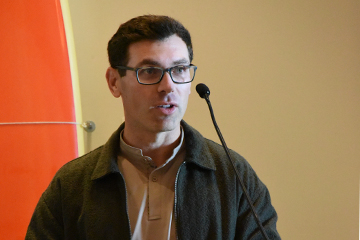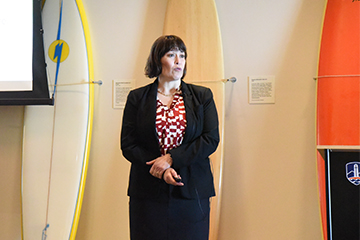From Print to Podium: Professors Martin Premoli and Kelle Marshall Premiere Newly Published Books During Joint Lecture

This fall two Seaver College faculty members, Martin Premoli, assistant professor of English, and Kelle Marshall, professor of French studies, published full-length books with the renowned Academic Division of Bloomsbury Publishing. To share their success, Pepperdine Libraries, in conjunction with the Humanities and Teacher Education Division Symposium, hosted back-to-back Book Talks on October 15, 2025, at Payson Library’s Surfboard Room.
Opening the event, Premoli discussed themes from his book Global Fictions and Environmental Disaster: Imagining Survival on Our Changing Planet, which examines contemporary literary depictions of “abnatural disasters,” so described by Premoli due to their unprecedented levels of intensity and devastation. His analysis is framed through a north-south axis, exploring environmental philosophies of marginalized communities in the US and the global south.
“With literature’s ability to link monumental shifts in time and its capacity for traversing disparate spaces,” said Premoli, “the novel can convincingly simulate and complexify both the intimate details and general contours of our increasingly modern world.”
 Premoli speaking
Premoli speaking
Structuring the book into five chapters, Premoli devotes the initial four to a comparative analysis of two contemporary novels written by authors of the respective aforementioned geographic areas that involve the same environmental disaster in their narratives. Rather than placing these texts in opposition, Premoli explores how the two perspectives inform one another.
The heart of Premoli’s book seeks to address central tensions of the Anthropocene—a proposed new geological epoch that places human beings as the primary agents of change within Earth’s geology and ecosystem, considering rising levels of pollution, species extinction, and climate concerns.
Spotlighting critical biodiversity loss and endangerment of species such as the Florida panther, Premoli's talk demonstrated how storytelling is one of the most powerful ways to fundamentally connect with people, inspiring actionable responses to global environmental concerns and affected communities in ways distinct from other methods of communication.
He explained, “Narrative plays a critical role in making the scale and space of biodiversity loss comprehensible, particularly for environmental audiences seeking to mobilize care, action, and ethical responsibility.”
Following Premoli’s lecture, Marshall discussed central topics of her book, Teachers as Mediators in Language Immersion Education: Navigating Ideologies, Cultures, and Identities, coauthored with Wendy Bokhorst-Heng. She expounded on the role of teachers as intercultural mediators within language immersion education programs across New Brunswick, Canada, the country’s only officially bilingual province.
For some historical context on the province’s bilingualism, Marshall noted that the French-descended Acadian people of New Brunswick were expelled by British forces during the mid-1700s with some later returning to settle in remote areas. For around 150 years, the Acadians lived in an English-majority society and had little social or political influence.
Twentieth century movements for Francophone language rights and cultural revitalization have since complexified Francophone-Anglophone intergroup relations, including in educational institutions. As an example, Marshall and Bokhorst-Heng found that these socio-historical factors inform Francophone—and mostly Acadian—teachers’ approaches to French immersion education in Anglophone schools. .
 Marshall addressing the audience
Marshall addressing the audience
In 2015, Marshall and Bokhorst-Heng began a qualitative study consisting of interviews with French immersion teachers and principals at nine different schools in New Brunswick. Since the immersion program is offered in Anglophone schools, most students come from English-speaking families. Considering most of the teachers interviewed were culturally and linguistically Francophone, many were either hesitant or unsure of how to navigate incorporating these identities into their work.
“We asked what ideologies inform and are reproduced in New Brunswick's current language ideological debates at the macro [societal] level of government and how these have been institutionalized in educational policy and curriculum,” Marshall said. “Then we uncovered how these ideologies were represented in the discourse of administrators and teachers in French immersion education.”
In response to their findings, and through the support of a Fulbright faculty fellowship in 2019, Marshall and Bokhorst-Heng designed a teacher education course to strengthen French immersion teachers’ abilities and confidence as intercultural mediators in holistic teaching environments—which is described in the last full chapter of their book.
“Language education is not always inherently attached to cultural education,” Marshall said. “Our research indicates that when language learning is commodified as simply a skill to be learned, the people who speak the languages and the cultures they represent may only be mentioned as background or ancillary information. This is why in our conclusion, Wendy and I advocate for a pedagogical stance in language education that is centered on intercultural mediation that values the ‘peopled’ nature of languages.”
Seaver College senior Kylie Yang, an attendee of the Book Talks, noted that the lectures by Premoli and Marshall enriched her understanding of the concerns they addressed. She was both inspired to be intentional with environmentally sustainable practices, and as a French speaker herself, intrigued to gain an awareness of a formerly under-researched topic.
“It was inspiring to see Dr. Premoli’s and Dr. Marshall’s colleagues in the audience supporting them,” Yang said. “It really reflects the strong sense of community Pepperdine fosters, not only among students, but among professors as well.”